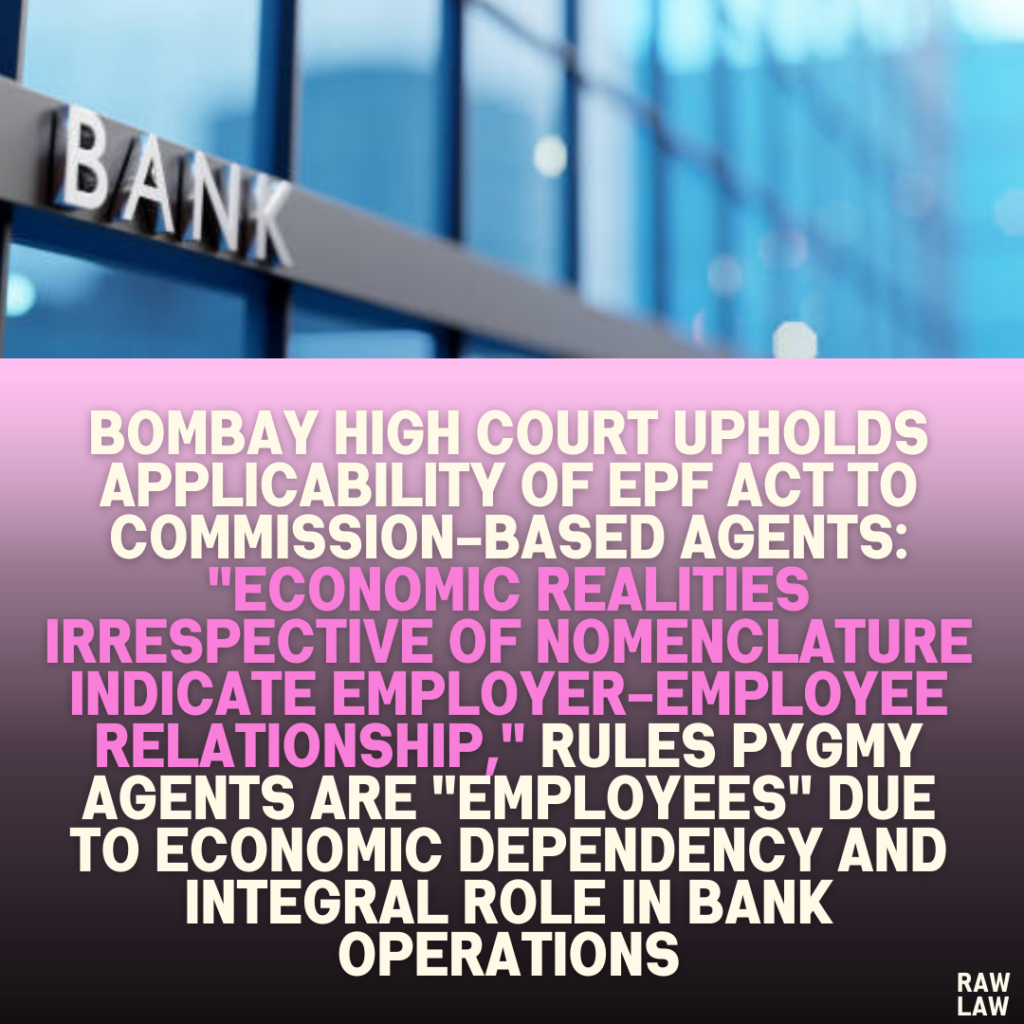Court’s Decision:
The Bombay High Court dismissed the writ petition filed by the petitioner, a cooperative bank, challenging the Regional Provident Fund Commissioner’s order. The court ruled that the petitioner bank’s commission-based agents, referred to as Pygmy Agents or Daily Deposit Collectors, are covered under the Employees’ Provident Fund and Miscellaneous Provisions (EPF & MP) Act, 1952. The court found that these agents had an economic dependency on the bank and were involved in activities integral to the bank’s operations, establishing an employer-employee relationship. It upheld the Commissioner’s detailed findings that the agents were employees within the meaning of the EPF Act.
Facts:
- Petitioner Bank: The petitioner is a cooperative bank regulated by the Banking Regulation Act, 1949, and covered under the EPF Act since 1978. It engages commission-based agents (Pygmy Agents) to collect daily deposits from customers.
- Dispute: The Regional Provident Fund Commissioner held that the Pygmy Agents were employees under the EPF Act and directed the bank to pay provident fund contributions for them. The petitioner challenged this finding, arguing that the agents were not employees but independent contractors earning commissions.
- Previous Proceedings:
- Earlier, the bank had challenged a similar determination by the Provident Fund Commissioner in Writ Petition No. 1106/2009, where the matter was remanded for fresh inquiry.
- Following the remand, the Commissioner conducted a detailed inquiry based on parameters set by the court in the Pachora Peoples Cooperative Bank Ltd v. EPFO case, leading to the impugned order.
- Economic Relationship: The agents’ activities involved collecting deposits and increasing the bank’s customer base, which were critical to the bank’s business operations.
Issues:
- Primary Question: Whether the Pygmy Agents qualify as “employees” under the EPF Act, 1952.
- Secondary Question: Whether the relationship between the petitioner bank and the Pygmy Agents constitutes an employer-employee relationship.
Petitioner’s Arguments:
- The petitioner argued that the agents were independent commission-based workers, not employees, and thus did not fall under the scope of the EPF Act.
- The agents:
- Were not salaried employees.
- Had no fixed working hours.
- Were not required to attend the bank daily or sign attendance registers.
- Were free to work for other organizations.
- The bank claimed that its relationship with the agents was limited to contractual agreements for deposit collection, which did not establish a “master-servant” relationship.
Respondent’s Arguments:
- The respondent argued that the agents’ activities were directly related to the bank’s business operations and that they were economically dependent on the bank.
- The EPF Act’s inclusive definition of “employee” (Section 2(f)) covers workers who are not regular employees but are essential to an establishment’s functioning.
- Citing precedents, the respondent emphasized that workers engaged on commission are often deemed employees for the purpose of labor welfare laws.
Analysis of the Law:
The court analyzed the legal definition of “employee” under Section 2(f) of the EPF Act, emphasizing:
- The term “employee” includes individuals engaged in work for wages, whether directly or indirectly.
- The relationship between the worker and the employer must be evaluated based on economic realities, not merely contractual terms.
The court referred to the detailed parameters outlined in the Pachora Peoples Cooperative Bank Ltd v. EPFO case to assess whether the agents were employees. These parameters include:
- Examining appointment contracts or agreements.
- Evaluating the control and supervision exercised by the employer.
- Determining whether the worker’s role is integral to the employer’s business operations.
Precedent Analysis:
- Pachora Peoples Cooperative Bank Ltd v. EPFO:
- Established detailed guidelines for determining employer-employee relationships, such as reviewing contracts and the nature of supervision.
- Emphasized that workers contributing to an establishment’s core activities could be considered employees.
- Indian Banks Association v. Workmen of Syndicate Banks:
- Clarified that commission-based workers could not be equated with regular employees but still fell under the EPF Act if their work was integral to the employer’s business.
- Pawan Hans Ltd v. Aviation Karmachari Sanghatana:
- Highlighted the inclusive nature of the EPF Act’s definition of “employee,” extending coverage to contractual workers performing essential services.
Court’s Reasoning:
- The court found that the agents’ work, though labeled as commission-based, was integral to the bank’s operations, making them economically dependent on the bank.
- The bank exercised control over the agents’ activities, meeting the criteria for a master-servant relationship.
- The Commissioner’s inquiry, which considered appointment contracts, the nature of work, and economic realities, was thorough and in compliance with the legal parameters.
The court also observed that the EPF Act aims to promote labor welfare and its provisions must be interpreted broadly to ensure coverage for workers contributing to an establishment’s success.
Conclusion:
The court dismissed the petitioner bank’s writ petition, ruling that:
- The EPF Act applies to the Pygmy Agents as they meet the criteria for employees under the Act.
- The Regional Provident Fund Commissioner’s findings were lawful and supported by evidence.
However, the court granted a six-week stay on the implementation of its order to allow the petitioner to seek alternative remedies.
Implications:
- Labor Welfare: This decision reinforces the principle that the EPF Act should be interpreted broadly to include workers who are integral to an establishment’s operations, even if they are not regular employees.
- Commission-Based Workers: Establishments employing commission-based workers must assess their obligations under labor welfare laws to avoid disputes.
- Future Disputes: The judgment sets a precedent for applying the EPF Act to workers in non-traditional employment relationships, emphasizing the importance of economic realities over contractual terms.




Pingback: Delhi High Court: Arbitrator’s Ruling on Crampon Compatibility Constitutes Interim Award— "Decision Can Be Challenged Under Section 34 of Arbitration Act" - Raw Law